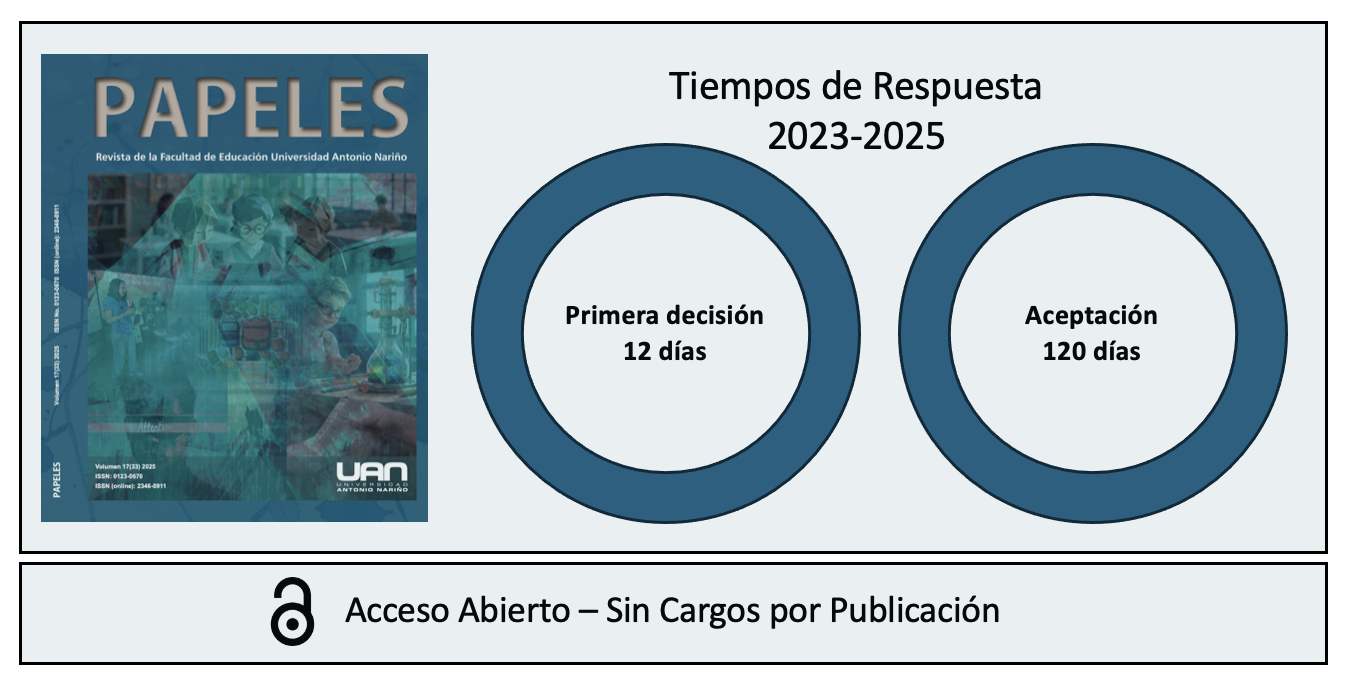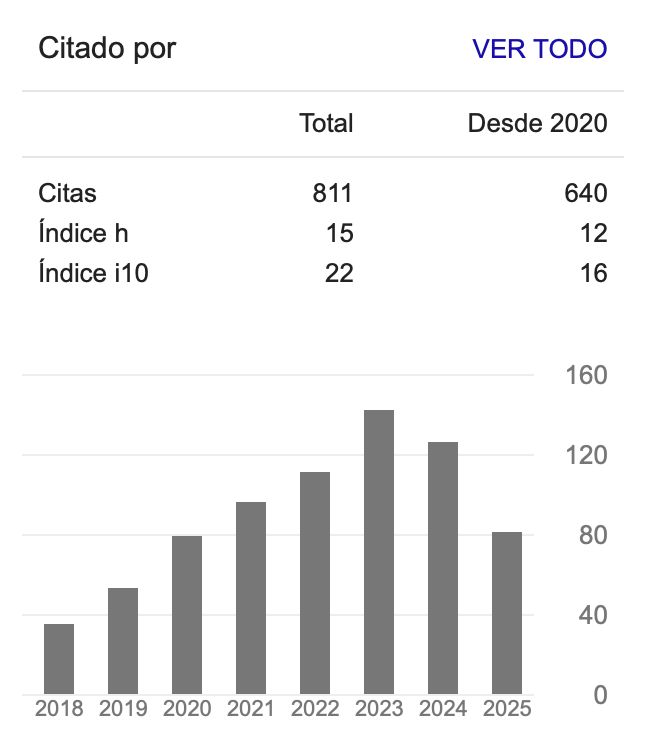Andamiaje metacognitivo para la búsqueda de información (Ambi): una propuesta para mejorar la consulta en línea
Palabras clave:
Andamiaje computacional, tecnologías de la Información, habilidades metacognitivas, búsqueda de informaciónResumen
El artículo propone el diseño estructurado de andamiajes computacionales que orientan la consulta en línea con el propósito de desarrollar habilidades metacognitivas en la búsqueda de información. Algunos estudios acerca de la búsqueda de información concluyen que los estudiantes no responden adecuadamente a sus tareas de aprendizaje cuando consultan la Web, pues se limitan a copiar y pegar los contenidos consultados, por lo que la calidad de las tareas no es la esperada. Los estudios atribuyen este hecho a la falta de habilidades metacognitivas que les impide a los estudiantes planear la búsqueda, supervisar las estrategias implementadas y evaluar la información seleccionada. En este sentido, se presenta la propuesta de un Andamiaje Metacognitivo para la Búsqueda de información (AMBI), el cual se diseñó a partir de los aportes de un modelo de autorregulación del aprendizaje basado en la teoría del procesamiento de la información.
Descargas
Citas
Azevedo, R. (2005). Scaffolding self-regulated learning and metacognition – Implications for the design of computer-based scaffolds. Instructional Science, 33, 367-379. doi: 10.1007/ s11251-005-1272-9
Azevedo, R., Cromley, J. y Seibert, D. (2004). Does adaptive scaffolding facilitate students ability to regulate their learning with hypermedia? Contemporary Educational Psychology, 29, 344-370. doi: 10.1016/j.cedpsych.2003.09.002
Brach, J. (2001). Junior high students and Think Alouds Generating information-seeking process data using concurrent verbal protocols. Library & Information Science Research, 23, 107-122.
Devolder, A., Braak, J. van y Tondeur, J. (2012). Supporting self-regulated learning in computer-based learning environments: systematic review of effects of scaffolding in the domain of science education. Journal of Computer Assistend Learning, 28, 557-573.
Flavell, J. (1979). Metacognition and cognitive monitoring- A new area of cognitive–developmental inquiry. American Psicology, 34, 906-911.
Friedman, B. (2005). Web Search Savvy
Hadwin, A, y Winne, P. (2001). CoNo- teS2: A software tool for promoting self- regulation. Educational Research and Evaluation, 7, 313-334.
Hannafin, M., Land, S., y Oliver, K. (1999). Open learning environments: Foundations, methods, and models. In C. Reigeluth (Ed.), Instructional design theories and models (Vol. 2, pp. 115-140). New York, US: Lawrence Erbaum Associates.
Karlssona, L., Koivulaa, L., Ruokonena, I., Kajaania, P., Antikainena, L., & Ruismäkia, H.. (2012). From novice to expert: Information seeking processes of university students and researchers. Procedia - Social and Behavioral Sciences, 45, 577-587. doi: 10.1016/j. sbspro.2012.06.595
Kim, M. y Hannafin, M. (2011). Scaffolding problem solving in technology-enhanced learning environments (TELEs): Bridging research and theory with practice. Computers & Education, 56, 403-417.
Kuiper, E., Volman, M., & Terwel, J. (2008). Integrating critical Web skills and content knowledge: Development and evaluation of a 5th grade educational program. Computers in Human Behavior, 24, 666–692. doi: 10.1016/j. chb.2007.01.022
Kwon, K., Hong, R, & Laffey, J. (2013). The educational impact of metacognitive group coordination in computer-supported collaborative learning. Computers in Human Behavior, 29 (2013), 1271-1281. doi: 10.1016/j. chb.2013.01.003
Lazonder, A, & Rouet, J. (2008). Information problem solving instruction: Some cognitive and metacognitive issues. Computers in Human Behavior, 24 (2008), 753-765. doi: 10.1016/j.chb.2007.01.025
Li, D, & Lim, C. (2008). Scaffolding online historical inquiry tasks: A case study of two secondary school classrooms. Science Direct, 50, 1395-1410. doi: doi: 10.1016/j. compedu.2006.12.013
López, O, & Hederich, C. (2010). Efecto de un andamiaje para facilitar el aprendizaje autorregulado en ambientes hipermedia. Revista Colombiana de Educación, 58, 14-39.
López, O, Hederich, C, & Camargo, A. (2012). Logro de aprendizaje en ambientes hipermediales: andamiaje autorregulador y estilo cognitivo. Revista Latinoamericana de Psicologia, 44(2),13-26.
Maglione, C., & Varlotta, N. (2012). Investigación, gestión y búsqueda de información en Internet Serie estrategias en el aula para el modelo 1 a 1, M. Néstor (Ed.)
Mannheimer, J. (2010). The effect of multiple scaffolding tools on students’ understanding, consideration of different perspectives, and misconceptions of a complex problem. Computers & Education, 54, 360-370. doi: 10.1016/j.compedu.2009.08.017
Mason, L, & Boldrin, A. (2008). Epistemic Metacognition in the Context of Information Searching on the Web. In M. Swe (Ed.), Knowing, Knowledge and Beliefs. Italy: Springer Netherlands.
Molenaar, I., Roda, C., Boxtel, C., & Sleegers, P. (2012). Dynamic scaffolding of socially regulated learning in a computer-based learning environment. Computers & Education, 59, 515-523. doi: 10.1016/j.compedu.2011.12.006
Molennar, I., A.M., C, & Sleegers, P. (2010). The effects of scaffolding metacognitive activities in small groups. Computers in Human Behavior, 26, 1227-1738.
Moos, D., & Azevedo, R. (2008). Monitoring, planning, and self-efficacy during learning with hypermedia: The impact of conceptual scaffolds. Computers in Human Behavior, 24(4), 1686-1706. doi: 10.1016/j. chb.2007.07.001 Nelson, Thomas, & Narens, Louis. (1990). Matamemory: a theoretical framework and new findings The psycology of learning and motivation, 26, 125-173.
NetDay. (2005). Our Voices, Our Future. National Report On Netday’s 2005 Speak Up Event, 3-37.
Notess, G. (2006). Teaching Web Search Skills: Techniques and Strategies of Top Trainers J. Bryans (Ed.)
Pew internet, & Proyect, America Life. (2012). How Teens Do Research in the Digital World. CollegeBoard, November 1.
Quintana, C, Zhang, M, & Krajcik, J. (2005). A framework for supporting metacognitive aspects of online inquiry through softwarebased scaffolding. Educational Psychologist,, 40, 235-244.
Radford, J., Bosanquet, P., Webster, R, Blatchford, P., & Rubie, C. (2014). Fostering learner independence through heuristic scaffolding: A valuable role for teaching assistants. International Journal of Educational Research, 63, 116-126.
Saito, H., & Miwa, K. (2007). Construction of a learning environment supporting learners’ reXection: A case of information seeking on the Web. Computers & Education, 49, 214- 229. doi: doi:10.1016/j.compedu.2005.07.001
Schalk, A. (2012). El impacto de las TIC en la educación. Relatoría de la Conferencia Internacional de Brasilia, 2010.
Spink, A., Park, M., & Koshman, S. (2006). Factors affecting assigned information problem ordering during Web search: An exploratory study. Information Processing and Management, 42, 1366–1378. doi: 10.1016/j. ipm.2006.01.007
Stronge, A, Rogers, W, & Fisk, A. (2006). Web-Based Information Search and Retrieval: Effects of Strategy Use and Age on Search Succes. Human Factors, 48(3), 434-446.
Tabatabai, D, & Shore, B. (2005). How experts and novices search the Web. Library & Information Science Research(27), 222-248. doi: doi:10.1016/j.lisr.2005.01.005
Thatcher, A. (2006). Information-seeking behaviours and cognitive search strategies in different search tasks on the WWW. International Journal of Industrial Ergonomics(36), 1055-1068. doi: 10.1016/j.ergon.2006.09.012
Van de Pol, J, Volman, M, & Beishuizen, J. (2010). Scaffolding in Teacher–Student Interaction: A Decade of Research. Educational Psychology Review, 22(3), 271-296. doi: 10.1007/s10648-010-9127-6
Wallace, R, Kupperman, J, & Krajcik, J. (2000). Science on the Web: Students Online in a Sixth-Grade Classroom. The journal of the leaerning sciences, 9, 75-104.
Wood, D., Bruner, J., & Ross, G. (1976). The role the tutoring in problem solving. Journal of Child Psychology and Psychiatry, 17(2), 89-100.
Yelland, N., & Masters, J. (2007). Rethinking scaffolding in the information age. Computers & Education, 48, 362–382. doi: 10.1016/j. compedu.2005.01.010
Zhang, M., & Quintana. (2012). Scaffolding strategies for supporting middle school students’ online inquiry processes. Computers & Education, 58. doi: 0.1016/j. compedu.2011.07.016
Descargas
Publicado
-
Resumen476
-
PDF297
Cómo citar
Número
Sección
Licencia

Esta obra está bajo una licencia internacional Creative Commons Atribución-NoComercial-CompartirIgual 4.0.







 Portal de Ciencia Abierta
Portal de Ciencia Abierta